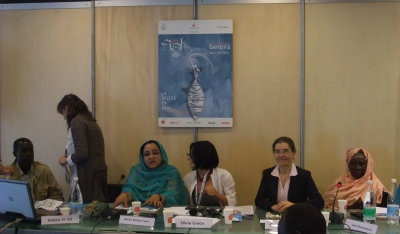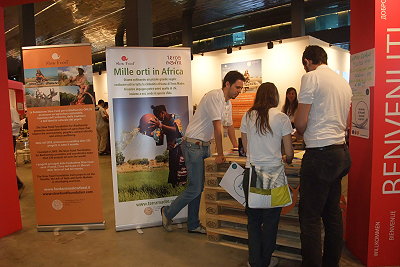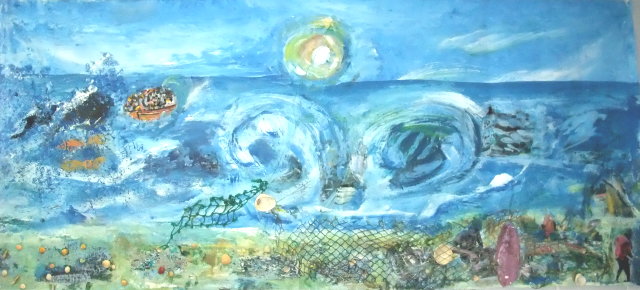Slow Fish workshop discusses fishing in Africa
Silvestro Greco, a fisheries biologist with international field experience and Coordinator of the Environment Area of Slow Food Italy, chaired the workshop on fishing in Africa. In his opening remarks he branded the debt European industrial fisheries have clocked up abroad and the still encountered predatory attitudes that stood in the way of shaping international relations inspired by care and sustainable use of the oceans and respect for the people of the sea everywhere.
The speakers were from Mauritania, Senegal, Kenya and Belgium.
 Nedwa Mochtar Nech of an NGO in Mauritania opened the round with a detailed historical account of how fisheries had developed in the last 20 or so years, mostly driven by foreigners, as locals, except the Imraguen in and around the Banc d'Arguin Protected Area, had lived largely turned with their backs to the sea. The local fishing that had developed with loans from businessmen is largely oriented towards exports. The international hygiene norms are not easy to meet for the women who edge into fish handling and marketing. They also resent the foreign industrial vessels taking massive catches that never touch the ground in Mauritania and leave little or no benefits for the local economy.
Nedwa Mochtar Nech of an NGO in Mauritania opened the round with a detailed historical account of how fisheries had developed in the last 20 or so years, mostly driven by foreigners, as locals, except the Imraguen in and around the Banc d'Arguin Protected Area, had lived largely turned with their backs to the sea. The local fishing that had developed with loans from businessmen is largely oriented towards exports. The international hygiene norms are not easy to meet for the women who edge into fish handling and marketing. They also resent the foreign industrial vessels taking massive catches that never touch the ground in Mauritania and leave little or no benefits for the local economy.
Madien Seck is a journalist from Senegal who reports about small-scale fishermen and farmers. He denounced earlier fishing agreements struck on unequal terms with the government at the expense of local fishers. The proceeds were rarely used to improve local infrastructure or to provide other services to the public. He also cast doubt on whether joint ventures between foreign boat owners and local businessmen were granted fishing licences in a transparent way. He referred to Commissioner Damanaki in proposing not to grant licences under European fishing agreements to out-flagged vessels and seeking long-term sustainable and equitable relations. As a point of current news, the recent alleged issue of licences for already very heavily fished pelagic resources to 22 vessels flying Russian, Belizian, Comorian, Ukrainian and other flags, had drawn protest marches in Dakar from across the spectrum of industrial and artisanal Senegalese fishers.
 Haidar El Ali, a Senegalese of Lebanese descent, is a diver and astute campaigner for protecting the sea through marine protected areas and education. He drew attention to the weakening over the last years of institutions normally mandated to uphold democratic scrutiny of public policy and practice.
Haidar El Ali, a Senegalese of Lebanese descent, is a diver and astute campaigner for protecting the sea through marine protected areas and education. He drew attention to the weakening over the last years of institutions normally mandated to uphold democratic scrutiny of public policy and practice.
The effects were noticeable, e.g. in expanding narco-influence in the South of the country and the difficulties to enforce even existing legislation for nature protection. He showed an educational film illustrating how the respect for carrying sheep not to be sacrificed at the Tabasqui feast had no equivalent in the sea. He reported that his efforts to help with the protection of the Sine Saloum, 7000 hectares of closed area, had shown progress as a result of the protection. Taking for comparison the baseline study carried out initially, after six years of protection, 31 new species were recorded. The size of the specimens had increased and some biomass was now being exported outside the protected area – for good catches of the fishermen.
Mbeta Abdalla Mwanatumu from Kenya spoke in Swaheli and addressed the audience through an interpreter. She spoke about her women's group buying fish from the local men or on contract from visiting Tanzanian fishermen and how they regulate access to the resource and the market to keep the resource productive. They also use solar drying and smoking to get the otherwise highly perishable product to market.

This by now global phenomenon had been dubbed by Daniel Pauly and collaborators as 'fishing down marine food webs' in a pathbreaking paper in the scientific journal Science in 1998. The effects are not academic, but touch on real people's lives in many ways - by reducing once wealthy fishing communities in West Africa to taking their children out of school, replacing their national dish of thiof (a grouper, Epinephelus aeneus) by sardines and driving many into emigration. Wealthy consumers in the major markets in North America, Europe and Japan may not notice so much, because global trade provides them still with plenty of fish. Increasing commercial fraud may mislabel what consumers buy and put fantasy names on species from far-flung places as the originally preferred ones have gone commercially extinct or have become very rare indeed.
Working with young people in West Africa and Europe and explaining the research results to them has led to new search for more sustainable ways of harvesting and consuming fish. The young people have also started to develop interesting art work and practice of international solidarity. Promoting energy-efficient small-scale fisheries using selective gears and showing wider social distribution of benefits is one response. Others are to fight subsidies keeping uneconomical long-range fisheries in business and campaigns to stop rampant practices of fishing baby fish. Sources for more information provided were much sought after by the participants. The presentation is available here.








